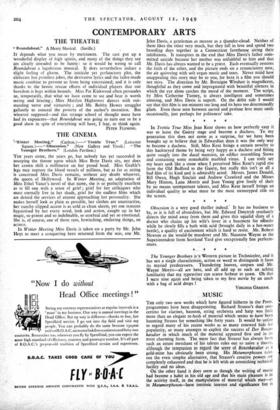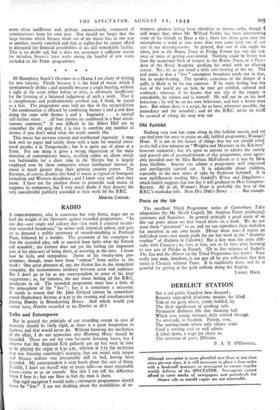MUSIC
THE only two new works which have figured hitherto in the Prom. programmes have been disappointing. Richard Strauss's duet con- certino for clarinet, bassoon, string orchestra and harp was little more than an elegant re-hash of material which seems to have been haunting Strauss for something like forty years. It would be unfair to regard many of his recent works as so many renewed bids for popularity, so many attempts to exploit the success of Der Rosen- kaudier in which much of the material appeared first and in its most charming form. The mere fact that Strauss has always been such an astute merchant of his talents rules out so naive a theory, although the temptation to regard the score of Rosenkauzlier as a gold-mine has obviously been strong. His Metamorphosen rules out the even simpler alternative, that Strauss's creative powers are completely exhausted and that he is left with an astonishing technical facility and no ideas. On the other hand it does seem as though the writing of music had become a habit in his old age and that his main pleasure is in the activity itself, in the manipulation of material which may—as in Metamorphosen—have intrinsic interest and significance but is more often indifferent and, perhaps unconsciously, composed of reminiscences from his own past. Nor should we forget that the large fortune which Strauss made out of his music has, in one way or another, mostly vanished and that at eighty-five he cannot afford to disregard the financial possibilities of his still remarkable facility. This is no doubt sad, but it does not constitute a sufficient reason for including Strauss's latest works among the handful of new works included in the Prom. programmes.
* * Of Humphrey Scarle's Overture to a Drama I am chary of writing for two reasons. Firstly because it is the kind of music which I spontaneously dislike ; and secondly because a single hearing, without a sight of the score either before or after, is obviously insufficient For the forming of a balanced judgement of such a work. That it is cacophonous and predominantly cerebral can, I think, be stated as a fact. The programme note told me that in the recapitulation "the condensation is effected by combining themes r and 4 and then doing the same with themes 2 and 3. Ingenuity . . . is carried still further when. . . all four themes are combined in a final simul- taneous statement." It was difficult in the Albert Hall not to remember the old quip that it is easy to combine any number of themes if you don't mind what the result sounds like.
This music has nervous tension and intellectual ingenuity it may look well on paper and satisfy those with a taste for musical cross- word puzzles a la Torquemada ; but it is quite out of place at • a Prom. For one thing it gives a wrong impression of the main direction of contemporary music, recalling rather an idiom which was fashionable for a short time in the 'thirties but is largely employed now by those composers whose intellectual interest in music is much greater than their genuine creative power. The Russians, of course, dismiss this kind of music as typical of bourgeois formalism and Western decadence ; and I know very well what they mean. I have not the smallest desire to proscribe such music or suppress its composers, but I very much doubt if they deserve the very considerable publicity accorded to their work 1))/ the B.B.C.
MARTIN COOPER.































 Previous page
Previous page